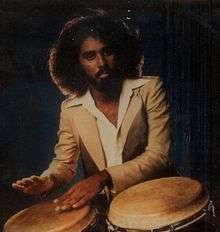Phillip Ingram
Phillip Ingram (born July 11, 1958) is an American musician. He is perhaps best known as one of the founding members of the Motown Group "Switch" and is the younger brother of James Ingram.
Phillip Ingram | |
|---|---|
 | |
| Background information | |
| Born | July 11, 1958 Akron, Ohio, United States |
| Origin | Reseda, California, United States |
| Genres | R&B, soul, pop jazz |
| Occupation(s) | Singer, songwriter, record producer |
| Instruments | Vocals, piano, keyboards, guitar, bass guitar, drums |
| Years active | 1975—present |
| Labels | Qwest, Motown |
| Associated acts | Switch, Sheena Easton, James Ingram |
Biography
Ingram was raised in Akron, Ohio. He came from a musical family with six brothers and sisters who all sang and played instruments but only Phillip and his older brother, James, pursued a musical career.
In December 1976, the band Switch was formed with Phillip Ingram, Greg Williams, Jody Sims, Bobby DeBarge, Tommy DeBarge and Eddie Fluellen.
Switch was signed to the Gordy subsidiary of Motown Records in May 1977 and went on to record five albums for the label, with Ingram sharing lead vocal duties with Bobby DeBarge. Their first album went platinum with such hits as "They'll Never Be", "I Wanna Be Closer." Their second album went gold, which included "Best Beat in Town" and "I Call Your Name."
Starting in 1984, Ingram went behind the scenes writing for various artists and working with various artists, films and commercials.
He still sings and records for television and radio commercials, works on films, radio station IDs, and recordings. In addition, he is working on production of new and upcoming artists along with Rex Salas. He has toured with Sheena Easton and a new incarnation of Switch.
College voice instructor
Ingram was a faculty member at the California College of Music (CCM) in Pasadena, California, and taught vocal lessons twice a week with their Vocal Arts Program.[1]
Personal life
Ingram has been married twice and lives with his second wife, Rebecca, in Reseda, California. Both are devout Jehovah's Witnesses, Ingram being an elder in his local congregation, as well as a pioneer, a person who devotes over 70 hours a month to the Jehovah's Witnesses evangelism.[2]
Discography
Albums (as Hot Ice)
- 1977: Pall Mall Groove (Released in Germany) (Polydor) (NOTE: Was released in the US as Smash in 1979 on the MCA-distributed Source label)
Albums
- 1978: Switch (Gordy)US No. 37, R&B No. 6
- 1979: Switch II (Gordy) – U.S. No. 37, R&B No. 8
- 1981: This Is My Dream (Gordy) – U.S. No. 85, R&B No. 21
- 1980: Reaching For Tomorrow (Gordy) – U.S. No. 57, R&B No. 23
- 1981: Switch V (Gordy) – U.S. No. 174, R&B No. 48
- 1983: Fresh Idea – Deco (Qwest Records)
Compilations
- 1991: The Best of Switch (Motown)
- 2001: 20th Century Masters – The Millennium Collection: The Best of Switch (Motown)
Singles
- 1978: "There'll Never Be" – US No. 36, R&B No. 6
- 1978: "I Wanna Be Closer" – R&B No. 22
- 1979: "Calling On All Girls"
- 1979: "Best Beat in Town" – U.S. No. 69, R&B No. 16
- 1979: "I Call Your Name" – U.S. No. 83, R&B No. 8
- 1980: "Love Over And Over Again" – R&B No. 9
- 1980: "Don't Take My Love Away" – R&B No. 41
- 1981: "I Do Love You" – R&B No. 73
- 1981: "You And I" – R&B No. 57
- 1982: "Call On Me" – R&B No. 70
Rich Boy sampled "I Call Your Name" in his song "Throw Some D's"; Ne-Yo sampled "I Call Your Name" in his song "It Just Ain't Right"
Soundtrack
- Back to School (1986)
- The Little Mermaid (1989)
- The Neverending Story III (1994)
- Father of the Bride Part II (1995)
- My Best Friend's Wedding (1997)
- The Fearless Four (1997)
- The Prince of Egypt (1998)
- Follow Your Heart (1999)
- Dinosaur (2000)
- Shrek (2001)
- Brother Bear 2 (2006)
Bibliography
- Vibe – October 2007 – Page 108-115 – Michael A. Gonzales: Broken Dreams
- All Music Guide to Soul: the Definitive Collection By Vladimir Bogdanov, Chris Woodstra, Stephen Thomas Erlewine
References
- "California College of Music". Ccmcollege.com. Archived from the original on March 11, 2015. Retrieved April 1, 2014.
External links
- Phillip Ingram on IMDb
- Phillip Ingram ReverbNation
- Phillip Ingram Discogs
- Phillip Ingram CCM Music School, Faculty
- Phillip Ingram Jazz Performance
- Phillip Ingram Official MySpace